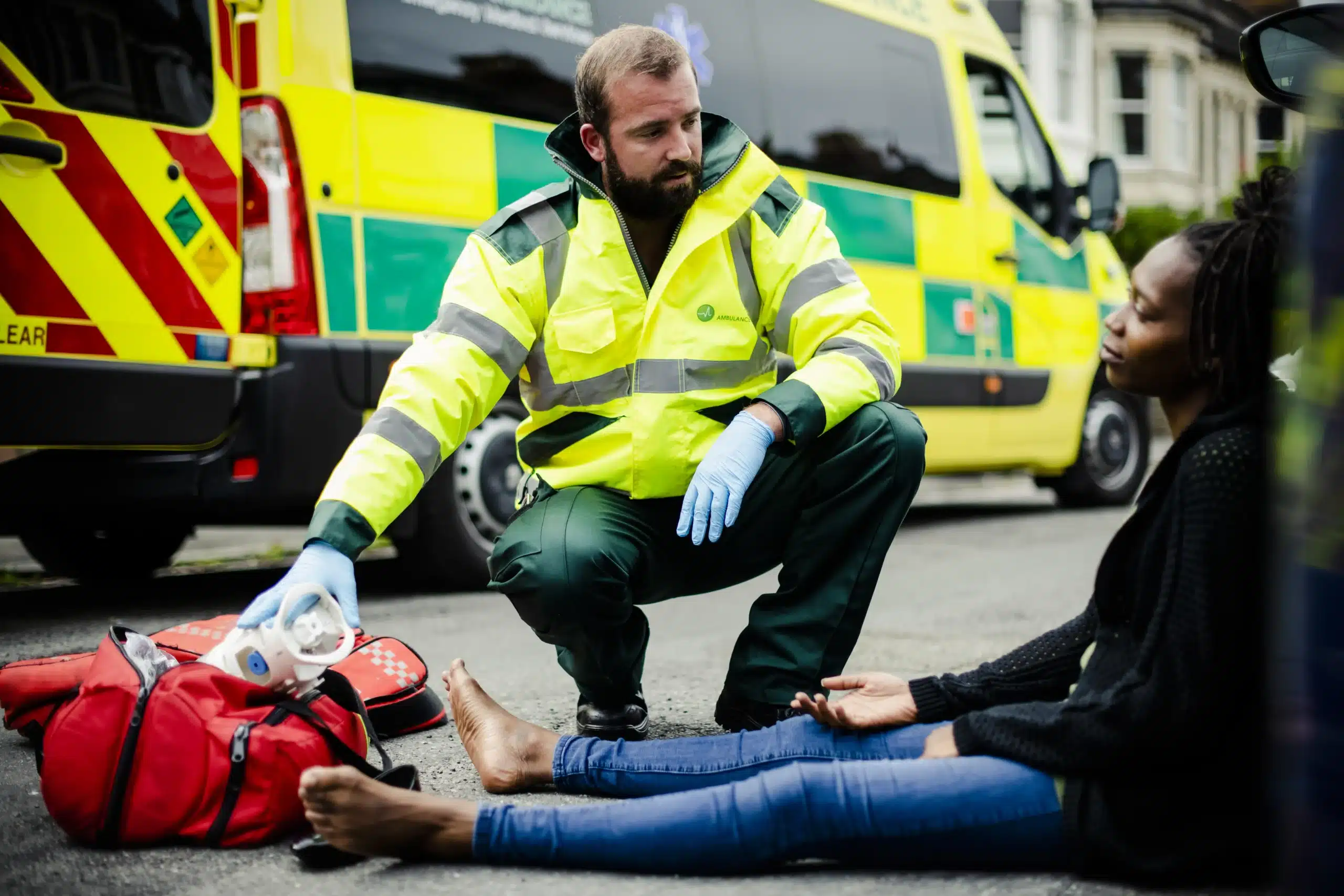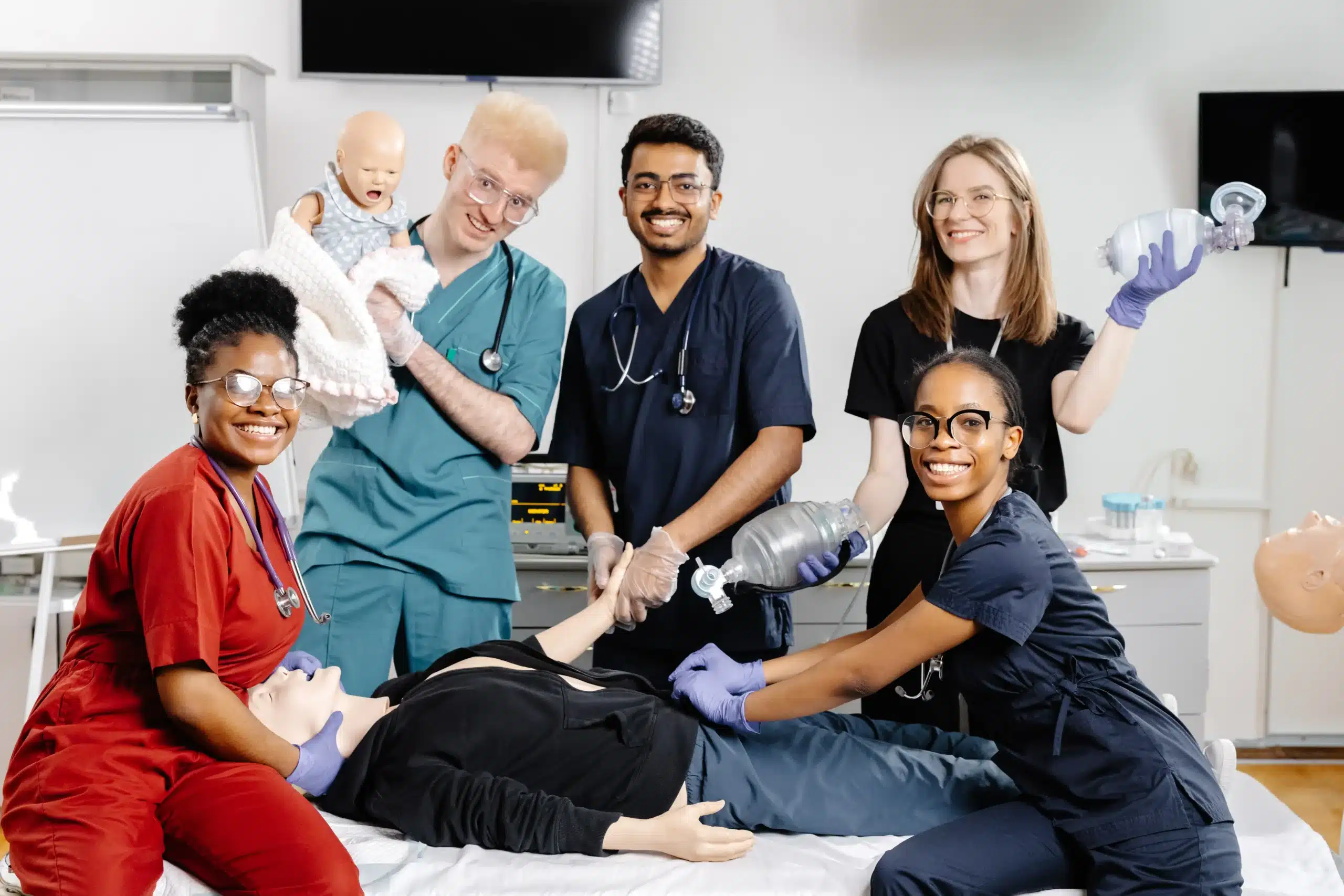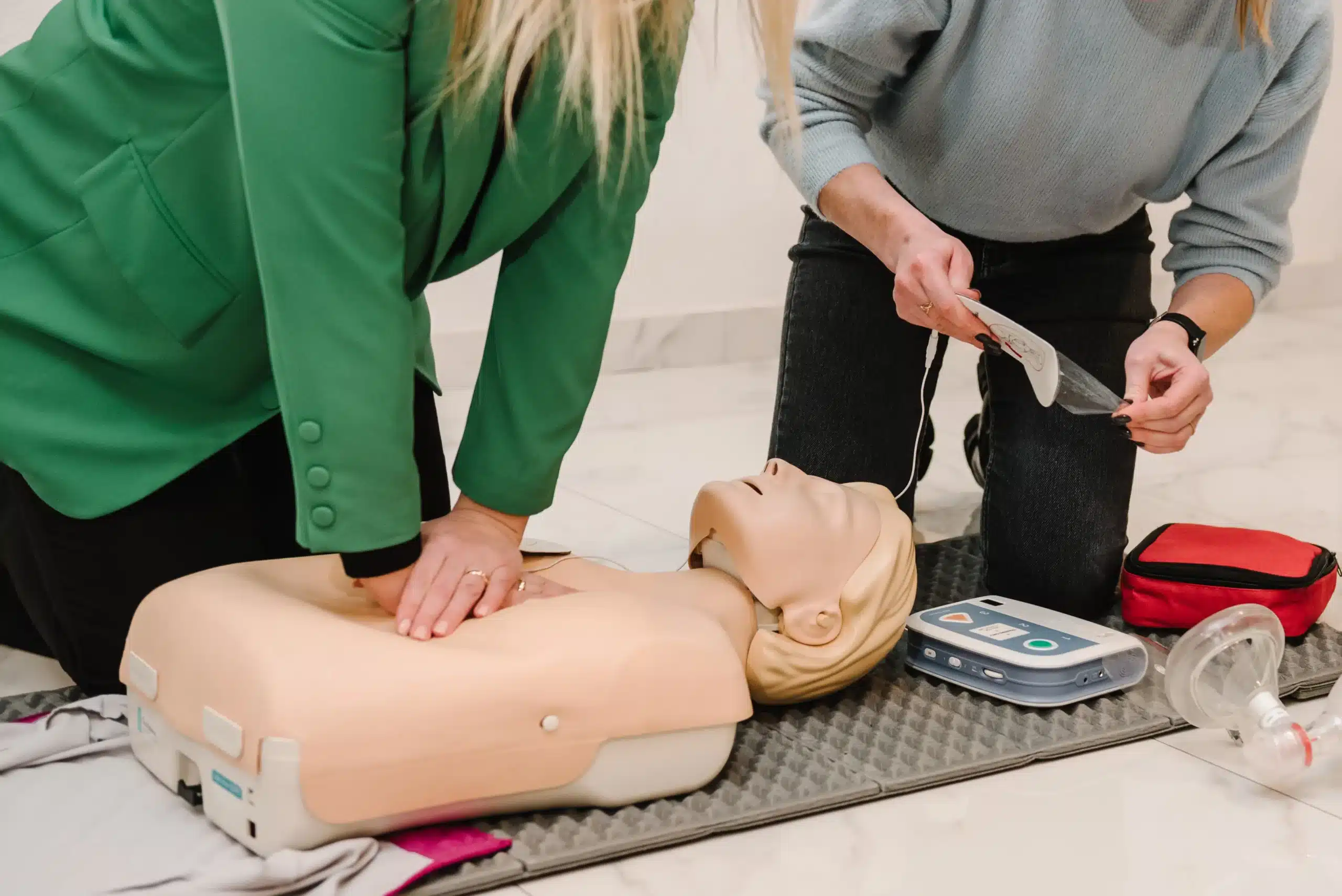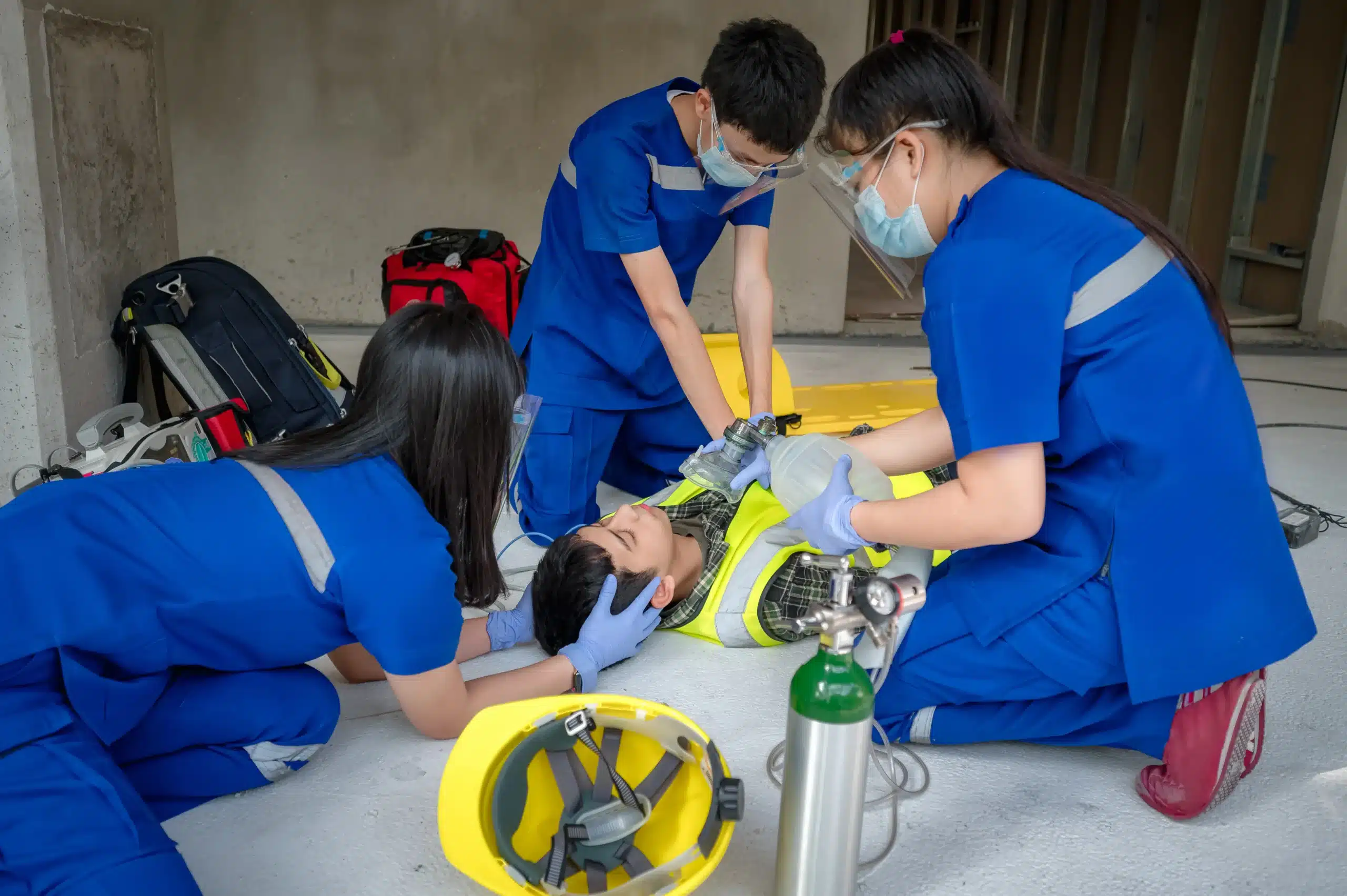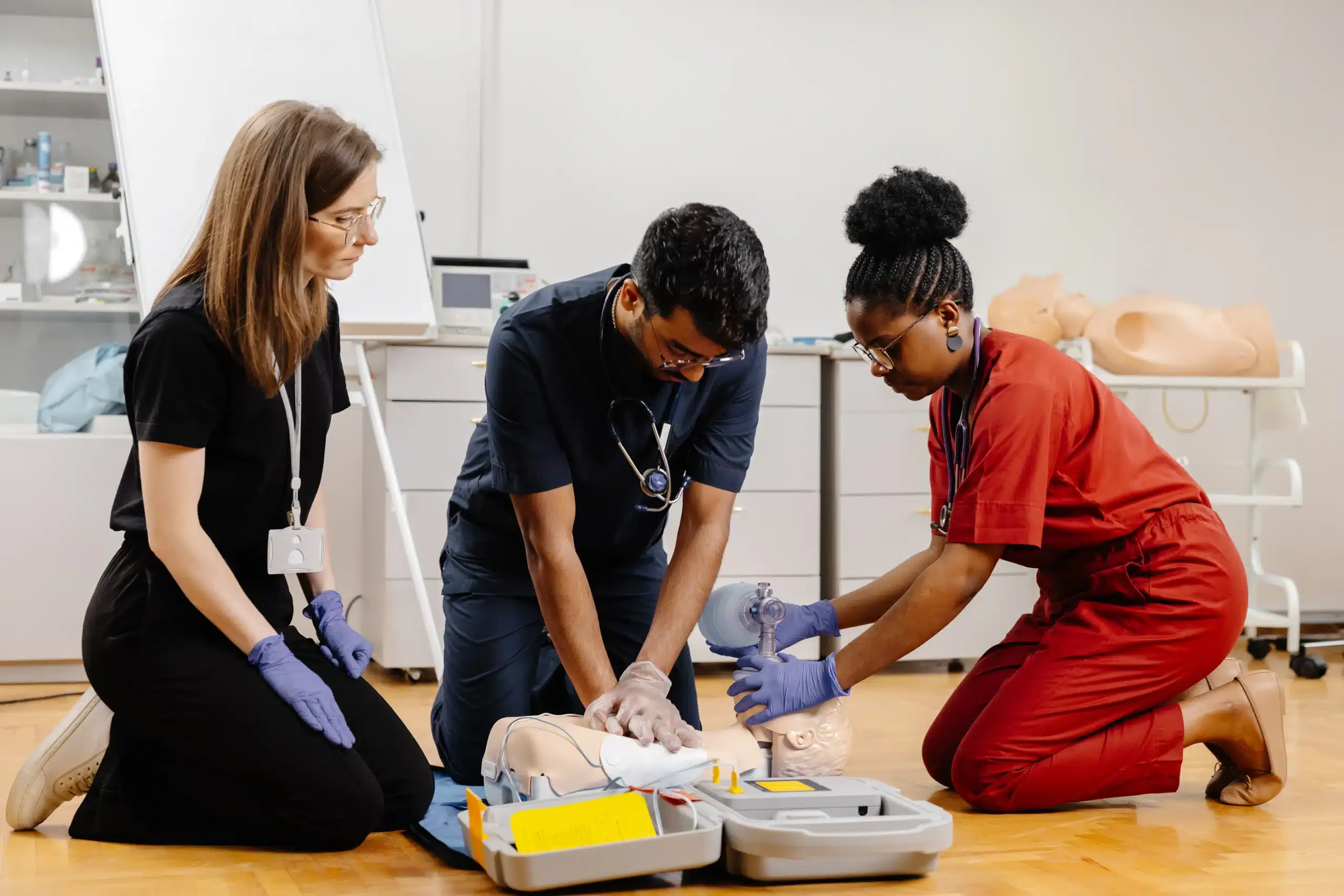Life as a healthcare provider, caregiver, or even just a concerned citizen can be unpredictable. Emergencies happen, and when they do, being prepared can make all the difference. That’s where BLS certification comes in. But what happens when your certification is about to expire? Don’t worry, we’ve got you covered. This comprehensive guide walks you through the steps of BLS renewal, helping you find convenient options for “BLS renewal near me,” understand the costs involved, and prepare for your course. We’ll explore different learning formats, discuss the importance of staying up-to-date with the latest guidelines, and offer practical tips to ensure you’re always ready to respond.
Key Takeaways
- BLS certification is a must-have for healthcare professionals and a valuable skill for anyone. Renewing keeps your skills sharp and ensures you’re ready for emergencies. Choose a course format—online, in-person, or blended—that works for you.
- From the American Heart Association and Red Cross to local colleges and online providers, many options exist for BLS renewal. Compare cost, content, and what’s included to find the best course.
- Staying current with BLS involves more than just renewing every two years. Regular practice, keeping up with the latest guidelines, and planning ahead for your next renewal are key to maintaining your skills and confidence.
What is BLS Renewal & Why is it Important?
This section clarifies BLS certification and why staying current is critical, especially for healthcare providers and other professionals who use these lifesaving skills.
What is BLS Certification?
Basic Life Support (BLS) certification equips individuals with the skills to respond to cardiopulmonary emergencies. It emphasizes high-quality chest compressions and rescue breaths when appropriate. This training covers recognizing life-threatening emergencies, providing chest compressions, using an AED, and relieving choking. BLS certification is essential for healthcare professionals and valuable for anyone who wants to be prepared. Many misconceptions exist about BLS certification, so it’s important to get accurate information from credible sources like the American Heart Association. Remember that BLS certification is typically valid for two years, and staying current is key to maintaining your skills and meeting job requirements.
Why Renew BLS Promptly?
Renewing your BLS certification demonstrates your commitment to providing high-quality care. It ensures you’re up-to-date on the latest life support guidelines and techniques, which are constantly evolving. For many healthcare professionals, maintaining a current BLS certification is often a condition of employment. Beyond healthcare, various other professions, including lifeguards, fitness instructors, and childcare providers, benefit from having current BLS skills. Timely renewal ensures you’re always prepared to respond effectively in emergencies. You can find more details on BLS renewal requirements from resources like Heart Start CPR. Don’t let your certification lapse—stay prepared and confident in your abilities.
Find BLS Renewal Providers Near You
Finding the right BLS renewal provider can feel a little overwhelming with so many options available. Here’s a breakdown of common providers to help you in your search. I’ll cover the pros and cons of each so you can make an informed decision.
American Heart Association (AHA)
The American Heart Association (AHA) is a trusted name in CPR and BLS training. They offer a standardized, widely accepted BLS certification. You can usually find classes through various local training centers, hospitals, and community organizations. AHA courses often include both online learning modules and in-person skills practice and testing. This blended learning approach offers flexibility while ensuring you get hands-on training. Providers like Berkeley CPR Classes offer BLS courses, which include online coursework, a skills test, and your certification card.
Red Cross
The Red Cross is another well-known provider of BLS renewal and recertification courses. Their courses are designed specifically for healthcare providers and other professionals who need to maintain their credentials. Like the AHA, the Red Cross offers a combination of online learning and in-person skills sessions. They emphasize practical application and real-world scenarios to prepare you for emergencies.
Local Community Colleges
Your local community college can be a great resource for affordable BLS renewal. Many colleges offer continuing education programs that include healthcare certifications like BLS. These courses are often taught by experienced instructors in a classroom setting, providing a structured learning environment. Check your community college’s website or give them a call to see what courses they offer.
Safety Training Seminars
Companies like Safety Training Seminars specialize in providing CPR and BLS training, often with a focus on group and corporate discounts. This can be a cost-effective option if you’re renewing with colleagues or need training for a larger group. They frequently offer various course formats, including online, in-person, and blended learning options. Safety Training Seminars offers group discounts and serves several cities in Northern California. You can find a CPR class near you by visiting their website.
Online Platforms
Several online platforms offer BLS renewal courses that you can complete entirely from home. This can be incredibly convenient for busy schedules. However, keep in mind that BLS certification requires a hands-on skills assessment, so purely online courses will typically require you to schedule an in-person skills check separately. Some online providers, like ACLS PALS & BLS Online Certification, offer group discounts and flexible scheduling.
Compare BLS Renewal Course Formats
Choosing the right BLS renewal course format depends on your learning style, schedule, and budget. Let’s break down the pros and cons of online, in-person, and hybrid options to help you decide what’s best for you.
Online Renewal: Pros & Cons
Online BLS renewal courses offer unmatched flexibility. You can study at your own pace, anytime, anywhere, making them perfect for busy professionals. All study materials are typically included with your online purchase, and the digital format often makes these courses more affordable. However, online courses may not provide the same level of hands-on practice as in-person training. If you learn best by doing, consider supplementing your online renewal with additional practice sessions.
In-Person Courses: Advantages & Disadvantages
In-person BLS renewal courses provide a structured learning environment with direct interaction with an instructor. This format allows for real-time feedback, hands-on practice, and the opportunity to ask questions and learn from others. The American Heart Association (AHA) offers in-person courses, ensuring you receive training that meets their high standards. However, in-person classes require a greater time commitment, as you’ll need to travel to a specific location and attend scheduled sessions. This can be challenging for those with inflexible schedules.
Hybrid Options: Flexibility and Hands-On Experience
Hybrid BLS renewal courses combine the best of both worlds. You’ll complete a portion of the coursework online at your own pace, then attend an in-person skills session for hands-on practice and evaluation. This format offers more flexibility than traditional in-person classes while still providing that crucial hands-on component. The Red Cross is one organization that offers blended learning options for BLS renewal. When considering hybrid or online group discounts, remember to factor in not only cost but also the quality of service and support provided. If your team needs different certifications, look for providers who can accommodate varied requirements.
Understand BLS Renewal Costs & Value
Knowing the price range for BLS renewal and what influences cost can help you budget and find the best fit. Let’s break down the expenses involved in maintaining this crucial certification.
Typical Price Ranges
BLS renewal costs vary. You might find options ranging from $65 to $120, with some providers, like Berkeley CPR Classes, bundling online coursework, skills testing, and your certification card for a comprehensive fee. Others, such as RCPALS, may offer a lower base price. Shopping around and comparing options is always recommended.
Factors Affecting Cost
Several factors influence the final cost of your BLS renewal. The training provider plays a significant role, as highlighted by CPR Care, and their pricing often reflects their included services and materials. Location can also be a factor, as prices may differ between areas or states. The course format—online, in-person, or blended—can also impact the overall cost.
Compare Provider Costs
When comparing providers, don’t just focus on the price. Consider the value. For example, the National CPR Foundation emphasizes a comprehensive curriculum covering heart anatomy and specific treatment protocols. Evaluate what each course offers to ensure it aligns with your professional needs and learning style. Our Northern CA CPR Directory can help you compare local providers.
Hidden Fees
Watch out for potential hidden fees. Some providers, like RCPALS, have cancellation policies that could result in forfeited fees. Always read the fine print to avoid unexpected expenses.
Discounts & Group Rates
If you’re renewing with colleagues or friends, explore group discounts. Many providers, including ACLS PALS & BLS Online Certification and Recertification and American BLS, offer reduced rates for group enrollments. This can be a smart way to save money while learning alongside your team. Check out our own group discount options.
Maximize Your Investment
Think of BLS renewal as an investment in your career and the well-being of those you serve. While cost is a valid concern, American Health Training rightly points out that the benefits of maintaining your certification outweigh the upfront expense. A current BLS certification can open professional doors and empower you to respond confidently in critical situations.
Enroll in a BLS Renewal Course
Getting your BLS recertified is straightforward. Here’s what you need to know about enrolling in a renewal course:
Steps to Enroll
The first step is to find a certified training center or online platform offering BLS renewal courses. Reputable providers, like the American Heart Association (AHA), often have user-friendly websites where you can locate courses, compare schedules, and begin the registration process. You’ll typically create an account, select your desired course date and time, and provide some basic information. Many providers allow you to complete the payment process online, streamlining the entire enrollment experience. Safety Training Seminars offers a variety of courses in Brentwood and surrounding areas.
Required Materials & Prerequisites
Before your course begins, confirm what materials you’ll need. Some providers include training materials in the course fee, while others may require you to purchase a student handbook separately. Check with your chosen provider to clarify any prerequisites and required materials. Generally, you’ll need a current BLS Provider card to be eligible for a renewal course. For local classes, check out Safety Training Seminars in Brentwood, CA.
Course Duration & Time Commitment
BLS renewal courses are generally shorter than initial certification courses. While a first-time BLS course can take around four hours, renewal courses often average around two and a half hours. This shorter time commitment makes it easier to fit the training into your busy schedule.
Choose the Right Course
When selecting a BLS renewal course, consider factors like location, schedule, and course format. The American Heart Association (AHA) offers various course formats, including in-person and blended learning options (combining online modules with in-person skills sessions). Choose a format that aligns with your learning preferences and availability. Also, consider the provider’s reputation and ensure they offer AHA-certified courses that meet your workplace requirements. Brentwood CPR Classes offers a range of AHA-certified courses.
Prepare for Your BLS Renewal Course
Getting ready for your BLS renewal doesn’t have to be stressful. Knowing what to expect, how to prepare, and what happens after the course will set you up for success. This section covers everything you need to know before you walk into the classroom or log in for an online course.
What to Expect
The American Heart Association (AHA) offers a few ways to renew your BLS certification, including convenient online courses and traditional in-person classes. Many providers use a blended learning approach with online coursework combined with an in-person skills test. BLS renewal coursework is designed for healthcare professionals, including doctors, nurses, and other providers. The course covers essential life-saving skills for various medical emergencies, both as an individual rescuer and as part of a team. You’ll review core concepts like CPR, using an AED, and relieving choking.
Tips for Success
While cost can be a concern, the long-term benefits of BLS certification far outweigh the initial investment. Think of it as an investment in your career and the ability to provide high-quality care. Many BLS renewal courses include training materials, so check with your provider to see what’s included. Reviewing the BLS Provider Manual beforehand will refresh your knowledge and prepare you to participate actively during the skills session.
Post-Course Certification
After successfully completing the BLS recertification exam and skills check, you’ll receive your updated BLS provider card. This certification is typically valid for two years. The exam often involves multiple-choice questions, so focusing on key concepts during your course is essential. After receiving your card, keep it in a safe place and note the expiration date to plan for your next renewal.
Maintain Your BLS Certification
Once you’ve renewed your BLS certification, staying current is key. This keeps your skills sharp and ensures you’re prepared to provide high-quality care in an emergency. Here’s how to maintain your
Practice Regularly
Regular practice is essential for maintaining proficiency in BLS. Hands-on practice reinforces the techniques you learned in your BLS course and builds muscle memory, allowing you to respond effectively under pressure. Set aside time each month to review key procedures like chest compressions, rescue breaths, and using an AED. Even practicing with a friend or family member can make a difference.
Stay Updated on Guidelines
Staying informed about the latest American Heart Association (AHA) guidelines is crucial for providing effective emergency care. Guidelines can change as new research emerges, so it’s important to stay current. Subscribing to AHA updates or periodically reviewing their website ensures you’re always using the most up-to-date techniques. This commitment to ongoing learning demonstrates your dedication to providing high-quality care.
Plan Future Renewals
BLS certification is typically valid for two years. Don’t let it lapse! Plan your renewal in advance. Mark your calendar or set a reminder a few months before your certification expires. This gives you ample time to find a convenient renewal course and avoid last-minute scrambling. Renewing on time ensures you’re always prepared to respond to emergencies and maintain your professional credentials. Our team at Brentwood CPR Classes can help you find the right renewal course that fits your schedule and needs. We offer a variety of options to make the process as smooth as possible.
Related Articles
- BLS Renewal in Brentwood: Your Complete Guide – Brentwood CPR Classes
- BLS for Healthcare Providers in Brentwood: A Complete Guide – Brentwood CPR Classes
- BLS Certification in Brentwood: Your Complete Guide – Brentwood CPR Classes
- BLS Certification in Concord: Your Comprehensive Guide – Brentwood CPR Classes
- BLS Certification in Antioch: A Complete Guide
Frequently Asked Questions
How often do I need to renew my BLS certification? BLS certification is typically valid for two years. It’s essential to renew before your current certification expires to maintain your skills and meet any job requirements.
What’s the difference between online and in-person BLS renewal courses? Online courses offer flexibility, allowing you to learn at your own pace, while in-person courses provide a structured environment with direct instructor interaction and hands-on practice. Hybrid courses combine online learning with an in-person skills session.
Where can I find BLS renewal courses near me? Several organizations offer BLS renewal courses, including the American Heart Association (AHA), the Red Cross, local community colleges, and private training providers like Safety Training Seminars. You can often find courses by searching online or checking with local healthcare facilities. Safety Training Seminars offers courses in Brentwood and surrounding areas. Our Northern CA CPR Directory can help you locate providers near you.
How much does BLS renewal typically cost? The cost of BLS renewal varies depending on the provider, location, and course format. It typically ranges from $65 to $120. Some providers offer group discounts, so inquire about those if you’re renewing with colleagues.
What if my BLS certification has already expired? If your certification has expired, you’ll likely need to take a full BLS certification course rather than a renewal course. Check with your chosen training provider to confirm their policy and available course options.


